Thierry Meyssan - Translation Pete Kimberley - Commemoration du genocide armenien à Erevan
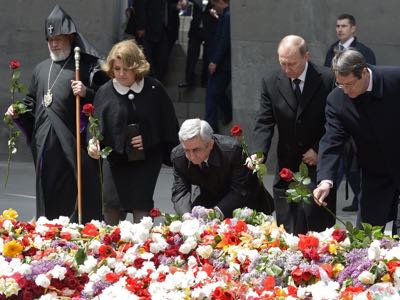
- Commemoration du genocide armenien à Erevan
In this article, I will not deal with the question of reparations, which I believe sullies the debate, but only the question of how we must act to oppose crimes against Humanity. I will use the term ’genocide’ in its original sense, given by Raphaël Lemkin, as « destruction of a nation or an ethnic group ». [1]
The centenary of the genocide of Turkish non-Muslims prepared the stage for festival of hypocrisy. While certain states celebrated the memory of the victims at Erevan, others showed themselves to be shameless.
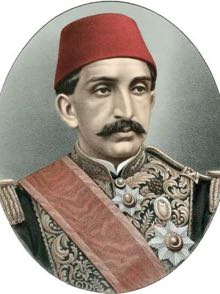
- Sultan Abdülhamid II wanted to create a homogenous Islamic Turkey. He therefore had to frighten away or kill the non-Muslim populations.
By draping itself in this absurdity, today’s Turkey is not only manifesting its support for the Hamidian massacres of Sultan Abdülhamid II (1894-95) – which caused between 80,000 and 300,000 victims – but especially for the crimes committed by the « Special Organisation » of the Union and Progress Committee (UPC), starting from 1915 until the election of Mustafa Kemal Atatürk as President of the Republic (1923), which caused between 1,200,000 and 1,500,000 deaths - and its ideological continuity with the ancient régime. And this is what we all noted with horror when, last year in 2014, we watched the Turkish army accompany the al-Nusra Front (in other words al-Qaïda in Syria) to Kessab for the purpose of chasing away the Armenian population. Or again, when the same Turkish army helped Daesh to dynamite the Deir ez-Zor Memorial, which commemorated the 1916 extermination of more than 200,000 Armeniens in the camp that the Turks had built for them.
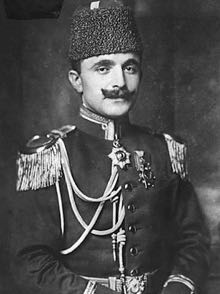
- Ismail Enver, known as « Enver Pacha », He overthrew Sultan Abdülhamid II, but continued his policy.
Pan-Islamism, the project of Sultan Abdülhamid II and the Young Turks early in the 20th century, like the AKP today, aims to become the leader of the sunnite world, and in order to achieve this aim, it intends to create a homogenous sunnite state. This project required the extermination of the Christians (Armenians, Pontic Greeks, and Assyro-Chaldeans) and the Yezidis. They all died, exactly as Daesh is exterminating Christians and Yezidis today.
The intervention of the Turkish army into Syrian territory, at Kessab and Deir ez-Zor, is coherent with this project, since Recep Tayyip Erdoğan hopes to annex Northern Syria once NATO has overthrown President Bachar el-Assad.
It is a fact that the pan-Islamist ideology is today adopted by the Muslim Brotherhood (and thus by the AKP, which is controlled by the Turkish branch of the Brotherhood), as well as by al-Qaïda and Daesh.
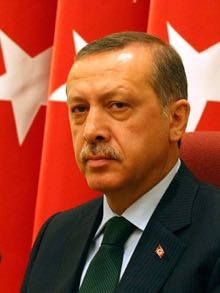
- Recep Tayyip Erdoğan hopes to reinstate the grandeur of the Ottoman Empire. He continued Sultan Abdülhamid II’s policy of genocide.
Another fact is that for a century in this region of the world, only Turkey and Daesh have committed the crime of genocide. And today, the former is helping the latter to do so.
It is not surprising that Turkey and Daesh are at war with the Syrian Arab Republic, because Syria embodies the opposite principle. The oldest country in the world has always welcomed people from the region who suffer from persecution, until it has become the « ethnic mosaïc » that it is today. In the years after 2000, Bachar el-Assad’s Minister of Defence, General Hassan Tourekmani, elaborated a « Defence Doctrine » based on the conservation of this diversity [2].
It is also a recognition of the role of the Dönmehs with the Young Turks. The Dönmehs were a kabbalistic sect which converted to Islam in the 17th century in order to escape persecution, but conserved its Jewish faith.
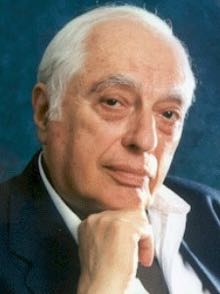
- Professor Bernard Lewis has always denied the genocide perpetrated by the Turkish government in the 20th
Israël’s support for the genocide of 1915 is not news, but it had never been expressed officially until now. We may remember the position of professor Bernard Lewis, ex-advisor to Benjamin Netanyahu, when he was ambassador to the UNO, then member of the National Security Council of the United States. He is above all a historian and a specialist on modern Turkey. The inventor of the « war of civilisations » strategy claimed in the French daily Le Monde that the massacre had been exaggerated and had never been planned, despite the fact that – unlike the genocide of the Jews by the Nazis – in this case, we have at our disposal documents which ordered the crime, and we know that the Western chancelleries were informed a long time in advance. Bernard Lewis was convicted in France for having damaged the interests of the Armenian community by deliberately hiding historical elements which invalidated his presentation of the facts [3].
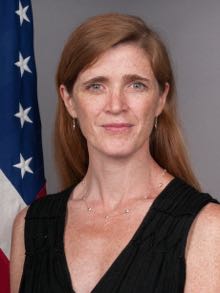
- Ambassador Samantha Power opposed the Security Council’s condemnation of the Turkish intervention with Al-Qaïda against the Armenians of Kessab.
For those who believe that the United States have changed and that today they are geuinely seeking to protect people who are persecuted because of their faith or ethnicity, the absence of US representation has shown that Washington has no morality, only interests. Ms.Power’s blather is only of importance when it allows her to condemn, with or without proof, the enemies of the United States.
By its absence at Erevan, Washington has demonstrated that it is on the side of crime, Turkey and Daesh.
The declarations of President Gauck
By recognising German « co-responsibility, and even, potentially, complicity » in the 1915 massacres, German President Joachim Gauck lifted the taboo concerning the continuance of the crime, and he did so with even more courage considering the strong Turkish presence in Germany and the absence of an Armenian electorate.
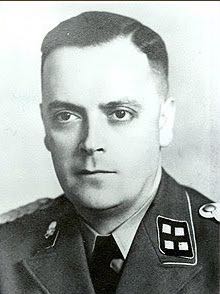
- An exemplary officer, Rudolf Höß acquired skill in matters of genocide in Turkey, during the 2nd Reich. He then became the director of the Auschwitz camp during the 3rd Reich.
Historians established the role of the German delegation in the genocide a long time ago. The orders of deportation signed by the Ottoman Vice-Chief of Staff, German general Fritz Bronsart von Schellendorf, have been published. The German Empire of William II had already tested genocide by exterminating the Hereros and the Namas in South-West Africa (now Namibia) in 1905. The German officers who observed and sometimes participated in the genocide of non-Muslims in Turkey put their skills to use during the Nazi régime. For example, this was the case for Rudolf Höß - his father participated in the genocide of the Hereros in 1905, as he did himself with the Armenians in 1916. He then became the commandant of the camp of Auschwitz from 1940 to 1943, where he massacred Jews, gypsies and Slavs.
In order to understand and prevent genocides, we must not study them from the point of view of the victims, but by correctly understanding the point of view of the executioners.
Until now, we have belived, wrongly, that the Young Turks and the Nazis were the only ones responsibles for the Armenian and Jewish genocides. But History shows us that the ideologies which led to these crimes were shared by others, before and after them, who also attempted to perpetrate them. Contrary to what we might imagine, there is no example of a genocide which was accomplished in a single operation, nor against a single population. These crimes continue for a very long time, and always concern several ethnic groups. It is therefore essential to condemn the first massacres, and to condemn the underlying ideologies in order to prevent the continuance of genocides.
Translation
Pete Kimberley
Pete Kimberley
[1] The UNO Convention of 1948 defines genocide more widely, as « acts committed with the intention of destroying, completely or in part, a national, ethnic, racial or religious group» (so genocide is not necessarily a question of murder – sterilising a population in order to cause their extinction is enough). Over the last few years, the word has taken on completely different meanings according to the contexts. For some, it is purely quantitative. They talk of genocide to mean mass killings (for example, the extermination of a population by famine induced by an economic system). For others, mainly Anglo-Saxon lawyers, it is exclusively qualitative. It then defines any hate-inspired murder, as long as it is founded on race or religion (killing a single person because of the colour of his skin, for example).
[2] The works of General Tourekmani are only available in Arabic, but his son Ali Tourekmani recently published a study oh his work , Why Syria?, which is currently being translated.
[3] « Condamnation judiciaire de Bernard Lewis » (The legal conviction of Bernard Lewis), Reseau Voltaire, 8th June 2004.


No comments:
Post a Comment